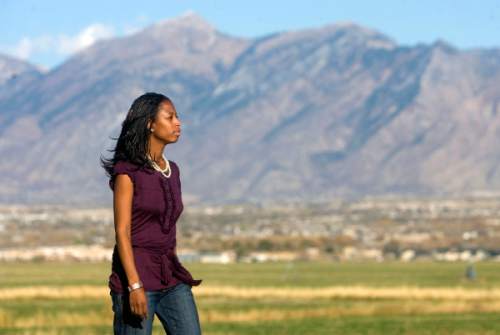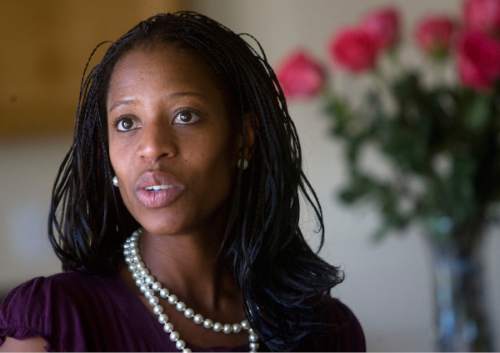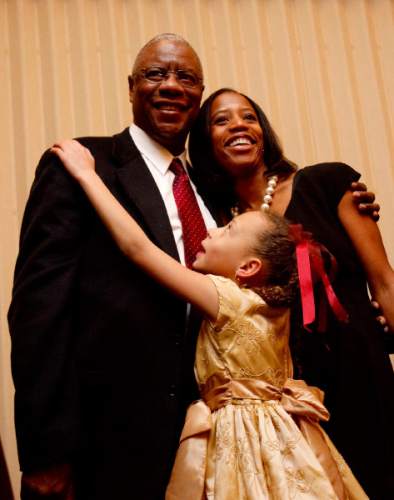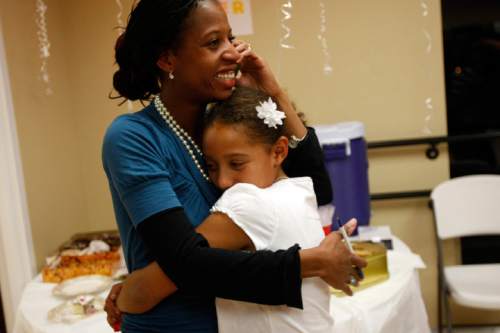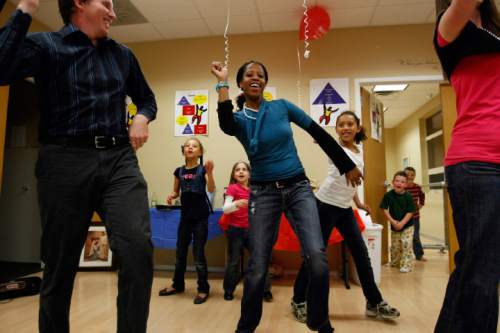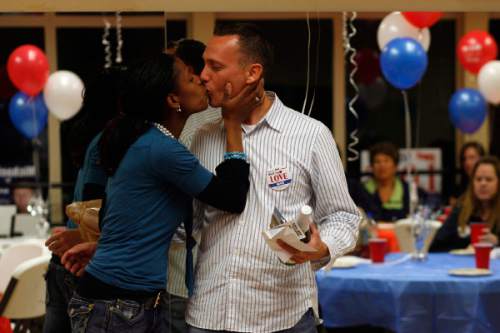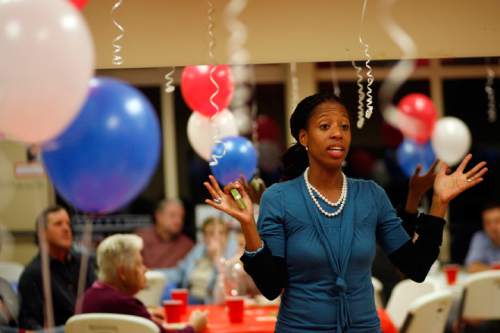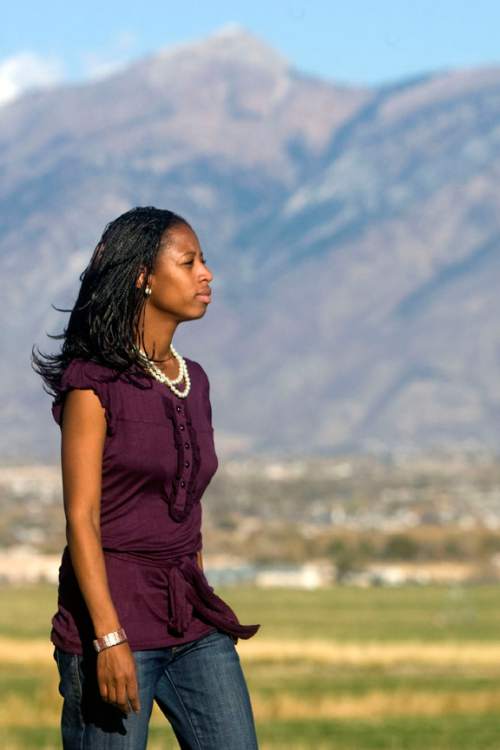This is an archived article that was published on sltrib.com in 2014, and information in the article may be outdated. It is provided only for personal research purposes and may not be reprinted.
Editor's note • This is the fourth in a series of occasional excerpts from "Mia Love: The Rise, Stumble and Resurgence of the Next GOP Star" by Tribune reporters Matt Canham, Robert Gehrke and Thomas Burr.
Jason Love, who had served a Mormon mission in the New York City area and become acquainted with Mia Bourdeau during that time, knocked on the door of her West Jordan studio apartment with his friend Jeron Christensen.
It was Labor Day 1998 and they had tickets for Timpanogos Cave, a stunning national monument with illuminated stalactites and stalagmites reached after an hourlong walk up a steep trail.
Mia was gung-ho, but her roommate Melanie Knudson wasn't so sure. By the time they approached the cave opening, Melanie had had enough and told the others she was returning to the car and that they should forge ahead. It was then that Jason realized he was interested in being more than friends with Mia.
"I really felt like Mia had a great sense of adventure and I really liked that about her," he said. For their first real date, he took Mia to a shooting range, where they fired off shotguns and pistols. It was the first time she had shot a gun, and she liked it.
After a few months, the two became engaged and each met the other's family. Neither Jason nor Mia felt race mattered to their prospective in-laws, but others raised the issue.
As Mia learned about the LDS Church, she heard from a few people that its members frowned on interracial marriage. Jason heard comments when people learned that he was dating a black woman.
"We encountered people here and there who were not necessarily supportive," he said, putting it delicately.
Their wedding was made all the more dramatic by an unexpected phone call.
The Broadway version of "Smokey Joe's Cafe" was looking for a replacement to play the role of Brenda, and the musical's producers wanted Mia to rush to New York for an audition. It was a chance to revive the role she played in the traveling production. More than that, it was a chance to fulfill her dream of starring in a real Broadway production.
"But I'm getting married on Friday," she said.
The producers wouldn't budge. If she wanted the role, she had to hurry to New York and postpone her nuptials. And they wanted an answer quickly.
Mia's first thought was that if she weren't getting married, there's no way she would have had an out-of-the-blue call from Broadway. And as she considered the offer, she started to view it through the lens of her new religion.
"This is the devil's way of trying to pull me away from this marriage," she thought. "I know it is Satan. Satan is doing it."
Jason said he'd support any decision she made, but he was hoping she'd still be slipping into a wedding dress that Friday. And that's what happened.
—
Political awakening • As the Loves started their family and Jason began making a decent salary in the software business, the two bought a house in Saratoga Springs, near Utah Lake in a new subdivision dubbed Loch Lomond. In a matter of weeks, she came face to face with a pernicious neighborhood plague — the midge.
It's a humble pest that grows to about the size of a mosquito, but without the bite. They swarm in the tens of thousands around lakeshores and when the south wind blew, they would descend on Loch Lomond and the Love household, turning the home's light yellow stucco nearly black and making it impossible to spend time outside. When anyone opened the door, hundreds of the flies would rush in.
These vexatious invasions lasted all summer. The developers at Hamlet Homes said it wasn't their responsibility to exterminate pests, leaving the Loves and their neighbors frustrated.
As the summer receded and the temperatures declined, so did the midges, allowing life to return to normal. That lasted a few weeks before the whole world changed when two passenger jets crashed into the World Trade Center.
As happened with many Americans, the Sept. 11 attacks crushed Mia emotionally and instantly altered her view of the world. No longer were foreign affairs foreign. The attacks also underscored how little she had tracked international events.
"I just wasn't paying attention," she said. "This was a turning point."
She started devouring TV news and, with her husband, she listened to Sean Hannity's talk-radio show. She began to develop a political outlook and it was decidedly conservative. Mia wanted a country with a strong military. She wanted to protect the American way of life. She started to feel a desire to get involved in some way, to speak up.
There's no comparing Sept. 11 to an invasion of bugs, but those two events — along with a federal appeals court ruling (later overturned) striking "under God" from the Pledge of Allegiance — converged to push Mia into a new realm of community activism.
When the city refused to take care if the midge problem, Mia and some outspoken neighbors ramped up pressure on the developer, eventually persuading him to buy and donate the equipment needed to eradicate the midges.
Weeks later, the residents would come to the defense of Hamlet Homes in its own fight with the city over the next phase of the development, which would add 50 modest homes marketed to first-time homebuyers.
One councilman said something to the effect of: "We don't want any more of those people in our community," according to Mia and Hamlet Homes owner Mike Brodsky.
About three dozen homeowners, including Mia, turned out at the next council meeting, creating a tense atmosphere in the packed council chambers.
The council approved the proposed development, but residents were still fired up.
"My whole neighborhood was like, 'OK, we are going to get one of "those kind of people" on the City Council,' " Mia said.
She had recently left her job to be a stay-at-home mother, yet the idea of serving part time on the City Council intrigued her. Neighbors encouraged her aspirations, as did her husband.
She raised a few hundred dollars from a real-estate agent friend and used the money to buy yard signs that displayed her name in big red letters. When Jason was home with the children, she'd hop on his sporty Suzuki SV650 motorcycle and zip to a neighborhood to knock on doors. When he wasn't home, she'd walk the community, taking her daughters along in a stroller. Over time, she hit just about every house, with roughly 3,000 residents in Saratoga Springs back then.
Mia ended up getting 345 votes that November, more than any other candidate. Her mother, Maria, responded with surprise. "I didn't think you were going to win."
—
Public office • Attending her first City Council meeting as a member in early 2004, Mia, then only 28, sat back and observed. She came to this conclusion: "Oh my gosh, everyone here is crazy."
She felt the council discussions became too philosophical, too removed from people's day-to-day reality. When the council debated whether to approve a gas station connected to a Wendy's restaurant, one member argued the combination was largely associated with highway off-ramps and, along with others, suggested it was undesirable.
Mia considered the conversation silly. She thought, but didn't say, "They have great burgers. I want a burger here. I don't want to go to American Fork to get a burger."
Eventually, Saratoga Springs got its Wendy's.
In that first term, she pushed the city to create a website and a library and supported an increase in impact fees on home developers to pay for city amenities. She pushed through an ordinance that effectively banned sexually oriented businesses from the city. And she spent considerable time researching city parks, as Saratoga Springs didn't have any.
Mia also caught the attention of reporters, but that had nothing to do with her politics.
Only six black people lived in Saratoga Springs in 2000, according to census estimates. And just 3,000 of Utah County's 500,000-plus residents were black. Three years later, Mia became the first black woman to hold any elective office in the county, and she considered her minority status a motivating factor.
"As an African-American woman, I feel really compelled to get involved," she said. "I never, ever want to use the race card, but I want my girls to know they can do anything they want. I want them to see me out there."
She said people at the grocery store have stopped to say, "I'm glad you are here," or that they like her hair.
"I think it goes to show people in Utah are perfectly open-minded," she said.
But she fielded odd questions and comments, too. One woman asked what kind of shampoo she used. A man asked her friend, "What do you call them?" Her friend responded: "Her name is Mia."
"Sometimes I get weird questions, but I think it's a lack of experience. I think it's funny. I think it's interesting," she said. "I haven't experienced anything negative about my race at all."
Mia credits her parents for making her "very comfortable in my skin. I don't walk around with a victim attitude." She says if someone mistreats her she doesn't "go first to race." And if she finds out a slight occurred because she's black, she thinks: "That's not my problem. That's their problem. I don't have to fix anything."
When Barack Obama became the first minority candidate to lock up the presidential nomination of a major political party, Mia hailed it as a major achievement for the nation, finding it "incredibly significant" and saying she'd consider voting for Obama over Sen. John McCain, R-Ariz.
She eventually voted for McCain after deciding she'd vote for the person she agreed with more. Still, she saw Obama's political success as a civil-rights victory.
"It is a huge step in equality," she said. "It shows us the American people are becoming colorblind. No more should we have victims, people saying they are held back and cannot solve problems because they are black. Now we have an example that says, 'I'm sorry, if this person can do it, anyone can do it.' "
—
Housing crash • That November, Mia won a second City Council term, just in time to grapple with the country's worst economic crash in nearly 80 years.
When the Great Recession of 2008 unfolded, Saratoga Springs took a particularly brutal hit. The fast-growing city's budget was supported largely by fees paid by homebuilders. When foreclosures began, construction in the city screeched to a halt.
The council ended up cutting about $2 million from the budget, requiring the layoff of eight of its 85 employees, and hiking property taxes 116 percent to raise an additional $1 million in revenues. Mia considers this a formative experience and reflects the tough work she believes Congress needs to tackle to reduce federal debt.
In 2009, Saratoga Springs' first and only mayor since incorporation retired after a decade and Mia filed to run, the only council member to do so. She survived a crowded primary, as did Jeff Francom, a financial planner.
Six weeks from Election Day, Francom announced that some unscrupulous soul (he said he suspected Mia or one of her supporters) sent a letter to his supervisor, and as a result, he was suddenly unemployed.
"There is an underhanded campaign going on that cost me my job," he said. "It's dirty politics."
Francom said the allegation that reached his company was that the mayor in Saratoga Springs was full time and that violated the company's policy about outside employment. He was instructed to drop his bid if he survived the primary election.
Eventually, the company bolstered Mia's denial she had any involvement, issuing a statement denying it had received any information on Francom from outsiders and said there were other reasons for his departure
On a vote of 900 to 603, Mia became Saratoga Springs' second elected mayor and the first black woman to hold such a position in Utah. She was 33 years old. And this time her family not only expected her victory but also was on hand to celebrate.
The race had turned out to be a bit more hard-edged than Mia anticipated, but it was tame compared to the next time her name would appear on the ballot.
Next: Mia Love looks for her next political challenge, and a bigger stage.
Buy the book:
"Mia Love: The Rise, Stumble and Resurgence of the Next GOP Star" is now available at four bookstores: Weller Book Works, 607 Trolley Square; The King's English Bookshop, 1511 S. 1500 East; Frost's Books, 1980 E. 2700 South; and Eborn Books, 254 S. Main. Check MiaLoveBook.com for more locations in the coming days.
Click here if you would like to order a paperback online.
The book is also available as an e-book through Amazon, Barnes and Noble and iTunes. —
At a glance
Tribune's book on Mia Love
A news article is often called the first draft of history. The Salt Lake Tribune is providing a second draft of Mia Love's story, a deeper look at events that brought her to the halls of Congress. To buy "Mia Love: The Rise, Stumble and Resurgence of the Next GOP Star" as an e-book or paperback, visit http://www.mialovebook.com. The paperback is available at four bookstores: Weller Book Works, 607 Trolley Square; The King's English Bookshop, 1511 S. 1500 East; Frost's Books, 1980 E. 2700 South; and Eborn Books, 254 S. Main. The e-book is also available through Amazon, Barnes and Noble and iTunes.


